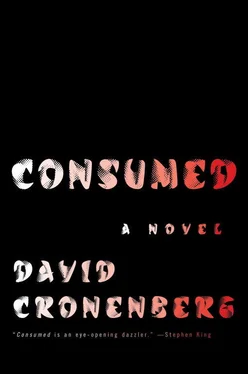David Cronenberg
CONSUMED
NAOMI WAS IN THE SCREEN. Or, more exactly, she was in the apartment in the QuickTime window in the screen, the small, shabby, scholarly apartment of Célestine and Aristide Arosteguy. She was there, sitting across from them as they sat side by side on an old couch—was it burgundy? was it corduroy?—talking to an off-camera interviewer. And with the white plastic earbuds in her ears, she was acoustically in the Arosteguy home as well. She felt the depth of the room and the three-dimensionality of the heads of this couple, sagacious heads with sensual faces, a matched pair, like brother and sister. She could smell the books jammed into the bookshelves behind them, feel the furious intellectual heat emanating from them. Everything in the frame was in focus—video did that, those small CCD or CMOS sensors; the nature of the medium, Naomi thought—and so the sense of depth into the room and into the books and the faces was intensified.
Célestine was talking, a Gauloise burning in her hand. Her fingernails were lacquered a purply red—or were they black? (the screen had a tendency to go magenta)—and her hair was up in an artfully messy bun with stray tendrils curling around her throat. “Well, yes, when you no longer have any desire, you are dead. Even desire for a product, a consumer item, is better than no desire at all. Desire for a camera, for instance, even a cheap one, a tawdry one, is enough to keep death at bay.” A wicked smile, an inhale of the cigarette with those lips. “If the desire is real, of course.” A catlike exhale of smoke, and a giggle.
A sixty-two-year-old woman, Célestine, but the European intellectual version of sixty-two, not the Midwestern American mall version. Naomi was amazed at Célestine’s lusciousness, her aura of style and drama, how her kinetic jewelry and her saucy slump on that couch seemed to blend together. She had never heard Célestine speak before—only now had a few interviews begun to emerge on the net, and only, of course, because of the murder. Célestine’s voice was husky and sensual, her English assured and playful, and lethally accurate. The dead woman intimidated Naomi.
Célestine turned languidly towards Aristide. Smoke tumbled from her mouth and nose and drifted over to him, like the passing of an evanescent baton. He took a breath to speak, inhaling the smoke, continuing her thought. “Even if you never get it, or, once having it, never use it. As long as you desire it. You can see this in the youngest babies. Their desire is fierce.” As he spoke these words, he began to stroke his tie, which was tucked into an elegant V-necked cashmere sweater. It was as though he were petting one of those fierce babies, and the gesture seemed to explain the blissful smile that suffused his face.
Célestine watched him for a moment, waited for the petting to stop, before she turned back to the unseen interviewer. “That’s why we say that the only authentic literature of the modern era is the owner’s manual.” Stretching forward towards the lens, revealing voluptuously freckled cleavage, Célestine fumbled for something off camera, then slumped back with a small, thick white booklet in her cigarette hand. She riffled through the pages, her face myopically close to the print—or was she smelling the paper, the ink?—until she found her page and began to read. “Auto-flash without red-eye reduction. Set this mode for taking pictures without people, or if you want to shoot right away without the red-eye function.” She laughed that rich, husky laugh, and repeated, this time with great drama, “Set this mode for taking pictures without people .” A shake of the head, eyes now closed to fully feel the richness of the words. “What author of the past century has produced more provocative and poignant writing than that?”
The window containing the Arosteguys shrank back to thumbnail size and became the lower left corner of a newscast window. The now tiny Arosteguys were still very relaxed and chatty, each picking up the conversation from the other like experienced handball players, but Naomi no longer heard what they said. Instead, it was the words of the overly earnest newscaster in the primary window that she heard. “It was in this very apartment of Célestine and Aristide Arosteguy, an apartment near the famous Sorbonne, of the University of Paris, that the grisly, butchered remains of a woman were found, a woman later identified as Célestine Arosteguy.” In the small window, the camera zoomed in on the amiably chatting Aristide. “Her husband, the renowned French philosopher and author Aristide Arosteguy, could not be found for questioning.” In one brutal cut Aristide disappeared, to be replaced by handheld, starkly front-lit shots of the tiny apartment’s kitchen, apparently taken at night. These soon swelled to full size and the newscaster’s window retreated to the upper right corner.
Forensic police wearing black surgical gloves were taking frosted plastic bags out of a fridge, photographing grimy pots and frying pans on the stove, sorting through dishes and cutlery. The miniature newscaster continued: “Sources wishing to remain unnamed have told us that there is evidence to suggest that parts of Célestine Arosteguy’s body were cooked on her own stove and eaten.”
Cut to a wide shot of an imposing municipal building subtitled “Préfecture de Police, Paris.” “Prefect of Police Auguste Vernier had this to say about the possible flight of Arosteguy from the country.” Cut to an interview with the strangely delicate, bespectacled prefect of police in what appeared to be a large hallway crammed with journalists. His French voice, emotionally intricate and intense, quickly faded to be replaced by a gravelly, less involved American one: “Mr. Arosteguy is a national treasure. So was Madame Célestine Moreau. It was a French ideal, the two of them, the philosopher couple. Her death is a national disaster.” A cutaway to the rambunctious crowd of journalists shouting questions, cameras and voice recorders bristling, then a return to the prefect. “Aristide Arosteguy left the country on a lecture tour of Asia three days before the remains of his wife were found. We have no specific reason at the moment to consider him a suspect in this crime, but naturally there are questions. It is true that we do not know exactly where he is. We are looking for him.”
The squawk of the carousel buzzer pulled Naomi out of the Préfecture de Police and back into the baggage claim arena of Charles de Gaulle Airport. As the conveyor belt lurched into action, the crowd of waiting passengers pressed forward. Somebody bumped Naomi’s laptop, sending it sliding down her shins, popping the earbuds out of her ears. She had been sitting on the edge of the carousel and had paid the price. Now she just managed to rescue her beloved MacBook Air by pivoting both feet up at the heels and catching the laptop with the toes of her sneakers. The Arosteguy report continued unperturbed in its window, but Naomi flipped the Air closed and put the Arosteguys to sleep for the time being.
NATHAN’S IPHONE RANG and he knew it was Naomi from the ringtone, the trill of an African tree frog that she had found somehow erotic and had emailed him. He was squatting on the floor of a damp, gritty, concrete back hallway of the Molnár Clinic, digging around in the camera bag in front of him, looking for something he suspected Naomi had taken, so it made sense that she would call him now, her extrasensory radar functioning in its usual freakish fashion. He kept digging with one hand, thumbing his phone on with the other. “Naomi, hey. Where are you?”
“I’m finally in Paris. I’m in a taxi heading for the Crillon. Where are you?”
Читать дальше
Конец ознакомительного отрывка
Купить книгу







![David Jagusson - Fesselspiele mit Meister David [Hardcore BDSM]](/books/486693/david-jagusson-fesselspiele-mit-meister-david-har-thumb.webp)




